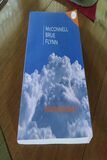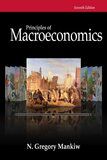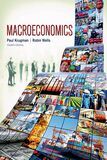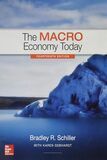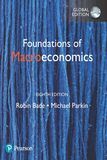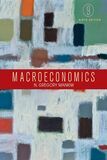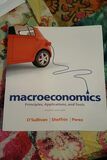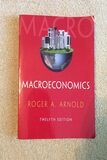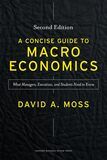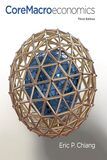10 Best Macroeconomics Books [2025]
- Macroeconomics: Principles, Problems, & Policies (Irwin Economics) (Get this book)
- Principles of Macroeconomics (Mankiw's Principles of Economics) (Get this book)
- Macroeconomics by Paul Krugman and Robin Wells (Get this book)
- The Macro Economy Today (The Mcgraw-Hill Series in Economics) (Get this book)
- Foundations of Macroeconomics (Get this book)
- Macroeconomics by N. Gregory Mankiw (Get this book)
- Macroeconomics: Principles, Applications, and Tools (Get this book)
- Macroeconomics by Roger A. Arnold (Get this book)
- A Concise Guide to Macroeconomics: What Managers, Executives, and Students Need to Know (Get this book)
- Core Macroeconomics (Get this book)
Other than your own business, multiple factors revolve around industries, national productivity, interest rates, inflation, etc. And if you do not understand these factors, your understanding of Economics your knowledge would be limited. And you would not be able to make prudent decisions because your business cannot survive on its own. And the productivity and revenue of your business is also dependent on these macro factors.
And we have made your work easy. Just look through the list of books and start with anyone you like. Reading all of the books on macroeconomics mentioned below will equip you with tools and comprehension about making a prudent business decision. Don't you think it is a great thing to master?
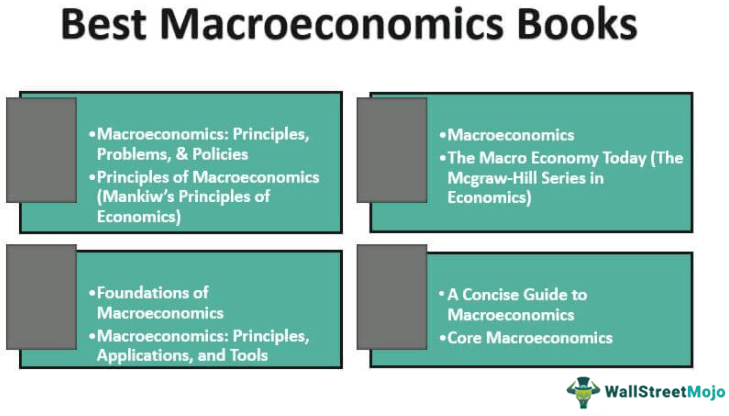
#1 - Macroeconomics: Principles, Problems, & Policies (Irwin Economics)
by Campbell McConnell, Stanley Brue, and Sean Flynn
Book Review:
Most of the readers who read this macroeconomics book have remarked that this book acts as a stand-alone book for macroeconomics. You can use this book and easily complete your course with the highest honor. And it is written in such a way that beginners to advanced learners can use it. It includes all the basic concepts of macroeconomics and consists of some advanced theories that help the learners stretch their learning to a new level. If you have ever enrolled in a university or applied for an online class, take this book with you as you learn the concepts and fundamentals of macroeconomics. It can be the go-to resource for every exercise and all relevant applications. If you are involved in a business and do not know what macroeconomics is all about, grab this book, and your decision-making ability will improve a lot more than before.
Key Takeaways
- It is one of the most widely used textbooks on macroeconomics. From students to instructors to business owners, all can benefit from this book and apply its teachings in their business & professional lives.
- The book is comprehensive (around 576 pages) and divided into meaningful divisions (quiz section, instructional section, and text materials), which make this book the most easy-to-use book of all. The writing is also very lucid.
#2 - Principles of Macroeconomics (Mankiw's Principles of Economics)
by N. Gregory Mankiw
That is another textbook you can pick up first (if you are a beginner in macroeconomics).
Book Review
If you want to learn the most important concepts, ideas, insights, and practical aspects of macroeconomics, this is the book you must read. It will help you since there is no fluff in this book. You will only get what you expect from this best macroeconomics book. Many readers of this book have mentioned that this book has been instrumental in teaching them how the economy works, how the macroeconomic factors affect business scenarios, and how the whole idea of macroeconomics makes sense in the large spectrum of business. The most surprising part about the book is this book makes the class unnecessary. Many students who have purchased and thoroughly read this book have remarked that they learned little from the class because they could learn all by themselves with the help of this book. Moreover, the author of this book has extensive experience teaching macroeconomics, microeconomics, the principle of economics, and statistics which helped this book come out well.
Key Takeaways
- Most books revolve around too many details that overwhelm the students. But to know the concepts and fundamentals of macroeconomics, you don't need to know everything at once. This book has done a great job of discarding the excess and talks about only essential concepts.
- This book is full of practical examples that make learning easy. Any student, professional, or business owner can take the help of this book to understand or refresh their concepts of macroeconomics.
#3 - Macroeconomics
by Paul Krugman and Robin Wells
If you enjoy macroeconomics and are eager to learn how the subject works, this book would certainly be one of your favorites.
Book Review
According to the readers of this macroeconomics book, the authors did a great job explaining the concepts of macroeconomics. And you do not need to be a rocket scientist to understand the fundamentals of this book because this book is written in such a way that there is no use for calculus and advanced Maths! The authors explained the topic without using difficult mathematics so that the new students could comprehend what they were reading about. Moreover, you will also understand the effect of the 2008's crisis in every chapter. As a result, you would relate to the concepts with relevant examples and practical applications. If you ever need to read a book in a lot more detail and do not want to complicate things with advanced maths and calculus, this book is for you. Instead of using it as a textbook, it is better to use it for your learning. And then, take a supplement text to learn the basic and advanced maths related to macroeconomics.
Key Takeaways
- Paul Krugman is a Nobel laureate. He is famous for his ability to connect recent events with the concepts of macroeconomics. He has done the same with his co-author Robin Wells in this book.
- This book is effective for anybody wanting to understand macroeconomics. Everyone can benefit from reading this book, from students to teachers, from instructors to business owners. The concepts are very well explained, and the book is also very comprehensive (around 595 pages).
#4 - The Macro Economy Today (The Mcgraw-Hill Series in Economics)
by Bradley Schiller and Karen Gebhardt
If you get bored easily with too many concepts of macroeconomics, read this book.
Book Review
This macroeconomics book is written for those who need a different model of learning macroeconomics. In reality, macroeconomics is a tricky subject. It often bores many students. Picking up this book will help you absorb concepts of macroeconomics much faster and learn much easier. Here's why. First of all, this book is written to understand different sections easily. This book also includes different text colors that help you pinpoint the important concept without any hassle. This book is a great read if your primary purpose is to cover a course at your college/university. It can be used as a textbook, and it is especially helpful for those who do not have much time for reading. But that does not mean the book skips a lot of concepts – no, it is quite comprehensive and includes all important aspects of macroeconomics to understand and learn all that you need to know in macroeconomics.
Key Takeaways
- The book's main takeaways are three: first, the book is very easy to read. Second, you can use it if you are involved in policymaking or critiquing them. Third, it's a great book for classroom learning.
- This macroeconomics book is highlighted throughout for the most important and usable sections. As a result, business owners can read the highlighted area quickly and then detail it before making significant decisions.
#5 - Foundations of Macroeconomics
by Robin Bade and Michael Parkin
This book will truly build your foundations in macroeconomics.
Book Review
This book is arranged differently to challenge the students even before learning anything. Every chapter of this book starts with a series of questions to pique one's interest. Once you read through the questions, jumping into the text material will seem easier, as if you are trying to find the answers to the questions you have already read at the beginning of the chapter. Every chapter is very easy to read, and you can go through them quite easily. However, you cannot skip even one chapter in between if you want the book to make sense to you, as there is a lot of recapitulation required to understand the new concepts. Moreover, this book includes a lot of real-life illustrations that make the reading relevant and active. So grab this book if you are a student and learn macroeconomics quickly. In addition, it comes up with supplement materials and power-points that make students' lives easier.
Key Takeaways
- This book covers a lot of takeaways. You could use MyEconLab, which comes with the book, to take online help for homework, tutorial, and assessment programs. You can also use the checkpoint system framework mentioned in this book for active learning. The authors encourage learning macroeconomics by applying the concepts in real life to make learning easier and more vibrant.
- This book also includes updated content that enhances the relevance of the ideas, and you, as students or business owners, can easily grasp the concepts.
#6 - Macroeconomics
by N. Gregory Mankiw
It is another masterpiece by Mankiw – a great textbook and a must-read for every economics student.
Book Review
If you take a macro class in your college, this book would be the perfect ally for you. You would be able to use the concepts well and learn how to make sense of the industrial factors, national income, national product, gross domestic product, gross national product, etc. The author is a professor at Harvard University and an avid practitioner of these concepts because he has been teaching his students for a long period. And all his experience in teaching has shaped this book. On the other hand, if you want to pick one textbook on macroeconomics, your search would end here. This macroeconomics book includes all the concepts you need to know in macroeconomics. And the only warning sign given by the students who have read this book is that this book is pretty heavy with concepts, so if you want a quick fix, this book is not for you. This book is for those who want to detail, understand every fundamental concept well, and extend their learning to real-life applications.
Key Takeaways
- It is a bestselling book on macroeconomics. One particular ingredient of this book is the clarity of concepts. You would be able to understand the theory, refer to relevant research, and various policies of macroeconomics.
- The author also talks about emerging concepts in macroeconomics that you wouldn't find anywhere else.
#7 - Macroeconomics: Principles, Applications, and Tools
by Arthur O’Sullivan, Steven Sheffrin, and Stephen Perez
If you opine that macroeconomics is the most unpleasant subject, this book busts that myth.
Book Review:
If you ever wonder how you would pass the macroeconomics class, do not worry. Grab this book, and you will be able to give your exam with flying colors. But this book is more helpful than that. The book may seem a bit lengthy at times, but to cover all the concepts of macroeconomics, one needs to explain everything in detail. This best macroeconomics book is also written well, making things as simple as possible. This book is different in a few aspects. It is not an average textbook on macroeconomics; this book is primarily written for students who are beginning to learn macroeconomics for the first time. Moreover, it's very straightforward and has provided many practical examples so that a new student can relate to new concepts. And the most attractive point of this book is its price. The recent edition costs much more than this book! As a result, students can save quite a lot from this book.
Key Takeaways
- This book has only one audience, and that's students. If you are a student and want to learn the new concepts of macroeconomics, this is a must-read for you. Moreover, you will save a lot of money on it as well.
- This book is arranged to make every concept easier to digest and apply. With the aid of this book, you will be able to pass the macroeconomics exam easily.
#8 - Macroeconomics
by Roger A. Arnold
Do you want a book on macroeconomics that you can use to pass the exam, master the subject, and learn the nitty-gritty? Well, your search ends here.
Book Review
This book is a masterpiece. The book's content is of superior quality (no boring GDP, NI, GNP definitions, and complexities). It also provides digital access to many materials that will truly revolutionize your understanding of macroeconomics. This book is written mainly for students. However, that does not mean that you cannot learn anything from this book if you're a business owner. Rather, as a business owner, it would be very useful to you as you will be able to learn all recent updates about macroeconomics; you will be able to watch relevant videos, and you will also be able to think like an economist. Yes, maybe sometimes, you feel that so much content is redundant. Still, if you can utilize the content well, you don't even need to touch another book to understand macroeconomics' fundamental concepts. You will also be able to access MindTap technology to learn the ideas on the go without wasting any time.
Key Takeaways
- The best takeaway is the way the book is written. Students never learn to love macroeconomics because the authors explain the concepts in a complex and dull routine. But this book is different. For example, do you think a soda on tax reduces obesity? Why is Greece facing financial problems? Learning like this is superior and helps students retain more information than simple explanations of the fundamental concepts.
- Other than that, you will have access to Aplia and MindTap technology to help you finish your homework, understand your progress, and provide momentum in studying the subject.
#9 - A Concise Guide to Macroeconomics: What Managers, Executives, and Students Need to Know
by David A. Moss
Till now, we have talked about textbooks on macroeconomics. However, this book will go beyond the idea of the textbook and would be more relevant for professionals.
Book Review
You would agree that experience matters a lot when you teach someone something. This book holds years of experience teaching economics at Harvard University. And the result of all those years of experience in this macroeconomics book can be a perfect guide for managers and students. However, it is not a textbook, if you are wondering. It is concise and relevant for those who are always pressed for time and don't get enough time to revisit their core competencies. Pick up this book and do a refresher course in macroeconomics. As a professional, you may know a lot of concepts already mentioned in this book; but never thought about all of these in the way they are described in this book. You will not only learn the concepts, insights, and fundamentals of the subject; you will also get to know how to intuitively think about it so that you can apply the same learning in your own life – personal and professional. Plus, it is pretty easy to read. What else do you want in a single book?
Key Takeaways
- This book is a must-read if you have ever wondered how things work between output, money, and expectations. This best macroeconomics book will teach you ways to be intuitive about the macro factors of economics.
- You will also be able to use many real-life examples while learning the concepts of macroeconomics, which will make your learning relevant and useful. For example, how to respond to macroeconomic events and develop intuition to apply your understanding to the newly found information etc.
#10 - Core Macroeconomics
by Eric Chiang
If you want to read the most human book on macroeconomics, this is the book you should read.
Book Review
Most colleges prefer textbooks filled with complex jargon or have no relevance to reality. But this book is different. This book is written for humans by a human. So, instead of running away from the book (because it is too difficult to sit around something so complex), you will find it pretty easy to read. Instead of impressing, you will relate to real-life examples that teach you the concepts. So, if you are planning to buy a more humane book in approach and written because the author wants to introduce the subject to new students, this is the book you should buy. Yes, there are many macroeconomics books available in the market. They all claim to teach you everything about macroeconomics, but how many students can digest the material through and through? In this case, the concepts are linked with illustrations, and all the fluffs are discarded. Therefore, even the macroeconomics instructors would get enough help through this book.
Key Takeaways
- You would be able to visualize every concept of the book. Don't you think that is the purpose of teaching? A teacher makes things so digestible that students cannot say no to the subject. This book does the same thing for anyone who would read this book.
- This best macroeconomics book includes new concepts in macroeconomics, more visual representation of every idea and notion, and new integrated media tools. These new resources make learning much easier for students.
